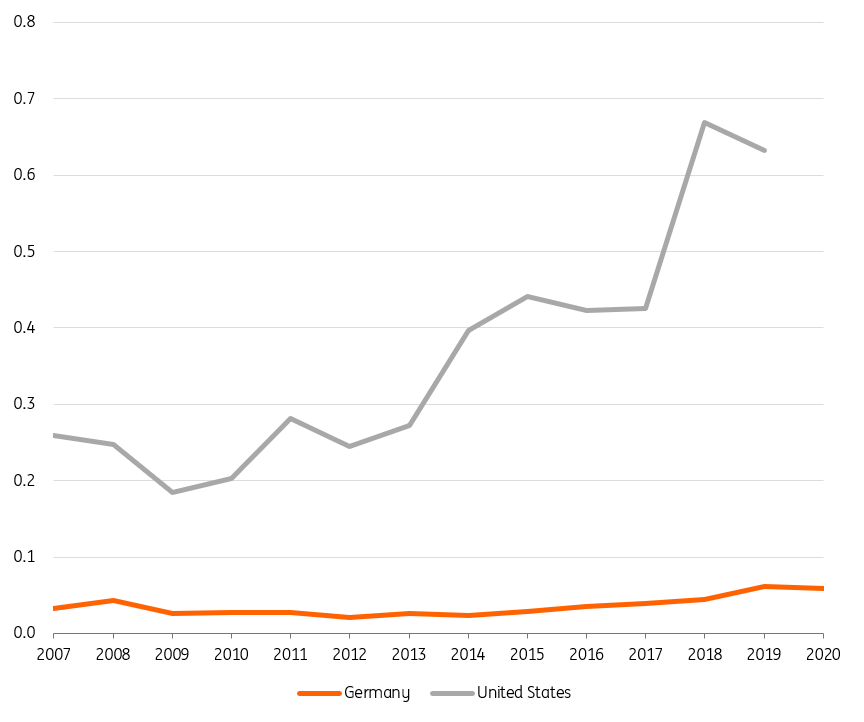Germany needs to be more than just mediocre
After more than 15 years leading Germany, Angela Merkel's time as Chancellor comes to an end this weekend when Germans vote in a general election. The German economy has many strengths, but weaknesses too. We look at the main challenges facing the new government and assess whether much-needed reform will actually happen
A political era comes to an end. How will a new one face the many challenges?
Sunday's general election will mean a political era comes to an end in Germany. Angela Merkel’s four terms in office have been accompanied by many global crises - financial, Greek, the euro, refugees and now the pandemic. Navigating the country through these crises has already been an enormous achievement, saving the eurozone from collapsing and getting the German economy out of every single emergency in relatively strong shape may be the most important. When it comes to more structural economic policies, however, the Merkel-era has rather disappointed and shows how complicated visionary policy-making can be.
The challenges and the urgency to address them have only increased
Looking ahead, the challenges and, above all, the urgency to address them have only increased in recent years. The topics are still the same as four years ago: it’s still about demographics, too much dependence on exports, a lack of digitisation and high-tech industries, mediocre education and too little investment and climate progress. You can still find them all in the parties’ election programmes, as was the case four years ago. The question is whether the next potential coalition will have the courage to actually deliver change.
So here's an overview of some of the most pressing economic issues.
Germany’s competitiveness isn't bad but structural weaknesses persist
Not everything is bad in the German economy. Far from it, Germany’s importance is not only proven by its position in the upper range of international rankings but also, above all, by the hard economic data, which shows an economy close to full employment and public finances – before the pandemic – in a very healthy state. However, as one of the world’s top export countries, the most important supply hub for Europe, a source of hidden champions and a strong research and development base, Germany is in a somewhat unfortunate place as far as global competition is concerned. And for that, we can blame inadequate digital infrastructure and a lack of attention to education, both of which have been lagging behind for years.
Germany’s position in international rankings had already weakened ahead of the elections in 2017. Even if the positions slightly differ across rankings, one thing is for sure: Germany's economic position has not improved.
Germany's global competitiveness
Rankings
Traditional sectors are still in the lead
Germany's success is primarily based on traditional industrial sectors. "Traditional" does not mean outdated. But German corporations play a lesser role in the New Economy. The technology giants, in particular, have emerged stronger from crises. And even in traditional segments, Germany has a very strong competitor in China.
Germany lags behind internationally when it comes to education, digitisation and venture capital. But enabling risky ideas is vital to future economic success as it nourishes innovation and challenges long-established companies and corporate structures. The country’s hidden champions are still a plus. But competition is coming here, too.
Issues that must be addressed
So let's take a look at the key areas where progress is desperately needed.
Lack of digitisation. This has become even more apparent during the pandemic. The digital infrastructure framework remains a major construction site. Germany still lags significantly behind its European peers when it comes to the integration of digital technology and digital public services. The fact is that Germany is still only in twelfth place in the European ranking, and doesn't make a splash in global ones either.
Education. This is an area where Germany rarely shines in international comparison and, again, it particularly suffered during the pandemic. Not only did an unclear school lockdown policy make teaching difficult, but there is also a lack of digital equipment. Education investment is a fundamental cornerstone of a thriving economy even if those investments don't pay off until years later.
Tax policy: It's complex and rates are high when you compare internationally, notably for corporate income and individual taxes. Regulation also doesn't make it easy for foreign companies.
Financing start-ups: Germany lags behind internationally when it comes to financing start-ups. In 2020, venture capital investments made up only 0.06% of GDP. It's 0.6% in the US. Start-ups are vital to future economic success as they bring in new ideas and challenge long-established companies and structures. Berlin, Munich and Hamburg have seen important start-up hubs established so yes, the picture is slowly changing. The 'dare to fail' culture is still somewhat absent in Germany, certainly when compared to what's going on in America.
Venture capital: Excess savings and low to negative interest rates have yet to trigger a new venture capital environment. The current federal government launched the ‘Future Fund’ in March 2021 to finance start-ups with high capital requirements. It is investing €10bn here while further private and public partners and existing instruments are supposed to mobilise another €40bn in venture capital for start-ups. This is sorely needed as the sum of the total venture capital investment in Germany in 2020 amounted to €1.9bn. Hopefully, this focus will also prevail with a new government.
Venture capital investment as a percentage of GDP

The baby boomers will be the kingmakers
Who will sit in the next government? The current election campaign and the possible coalition outcomes have rarely been as exciting as this year. The election could be the first to result in a three-party coalition, which by definition requires parties to cooperate with those who were perceived as being from the ‘opposite’ political camp. This creates not only room for new ideas, but also potential for conflict.
A majority of more than 1,000 people surveyed by the Bertelsmann Stiftung would like to see a realignment in the areas of refugee policy and integration, pensions, environmental and climate protection, education and housing, regardless of age. But while the young are more concerned with digitalisation and the environment, pensions and refugee policy top the concerns of the 50+ generation.
Voter demographics
The priorities of the older generation are significant as the political future of Germany essentially rests in their hands - the over-50s make up half of all voters and they’re most likely to turn out. Developments over recent months, however, have shown that German politics, or at least voter support, has become more fluid. Larger swings in the polls have become normal. The changes that the German electorate really want to see will be revealed on 26 September.
A challenging future requires focus and commitment
The next German government still has the chance to turn the tide before it is too late. A clearly defined investment programme, not only aimed at digitalisation, climate change and education but also at social inclusion and identifying a few future-oriented key sectors in which Germany wants to excel in the coming decades, should be in any new coalition agreement. The polls, however, indicate that the German electorate is not really looking for change. The rise of Olaf Scholz and the SPD suggests a preference for continuity over something new. We fear that the next government will have to deliver more economic change than most voters are hoping for.
This publication has been prepared by ING solely for information purposes irrespective of a particular user's means, financial situation or investment objectives. The information does not constitute investment recommendation, and nor is it investment, legal or tax advice or an offer or solicitation to purchase or sell any financial instrument. Read more
Download
Download article
20 September 2021
The formidable challenges facing Germany’s new leader This bundle contains 2 Articles
